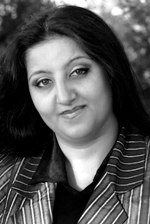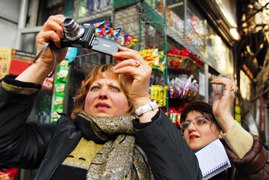 Eugenie Dolberg and Maysoon Pachachi remember a brave activist and journalist killed in Iraq earlier this month
Eugenie Dolberg and Maysoon Pachachi remember a brave activist and journalist killed in Iraq earlier this month
Sarwa Abdul Wahab Al Darwish was a 36-year-old Iraqi journalist from Mosul. On 4 May, Sarwa was in a taxi, returning from the market with her mother. The car was stopped and she was dragged out by two men attempting to kidnap her. Sarwa screamed and struggled against her would-be abductors. They shot her twice in the head and drove away.
We first met Sarwa in December 2006 when she came to Damascus with 11 other Iraqi women from five different cities — Baghdad, Basra, Mosul, Kirkuk and Falluja. They were there to take part in Open Shutters Iraq, a UNDP-funded participatory photography project.
For a month we all lived together in a house in the old city, where participants learned to take photographs so they could return to Iraq and create photo-stories about their lives there. Every day, they went out onto the streets to practice their photography. Then they would attend slide show sessions where their work was analysed. At the same time, they were asked to draw maps of their lives to present to the rest of us.
After the month in Damascus, participants returned to Iraq and, under very difficult circumstances, took pictures for their stories. Sarwa was a very supportive partner to another woman from Mosul with whom she had attended the workshop. After six weeks, the women came back to Syria to edit their photographs and write accompanying biographies and essays.

Sarwa arrived brandishing a piece of paper. ‘Look what they’ve written — they can’t even spell, and here they’re supposed to be quoting the Quran, but it’s a misquote, they got it wrong.’ She had found the note on her doorstep that morning. It was a death threat. Another woman on the project, from Basra, had received similar threats. We were very worried about both of them.
Sarwa’s death — the fact and the manner of it — is shocking for us who knew her and an unspeakable loss for her family, especially her long-widowed mother. But this kind of thing happens to women all over Iraq on a daily basis. Since the invasion and occupation of the country, there has been an exponential rise in the violence against women: whether it is people like Sarwa, working as journalists and activists, or doctors, professors, or simply women killed in so-called ‘honour crimes’.
It is a credit to Sarwa, and typical of many Iraqi women, that although she tried to protect herself as best she could, she was not willing to give up her work and cave in under the threats she received. Despite all the catastrophes that have befallen Iraq, you still find this spirit of dogged resistance — especially among the country’s women.





